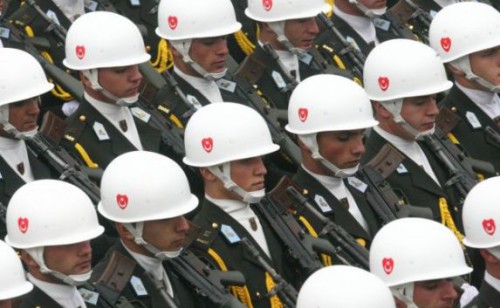mardi, 17 septembre 2013
Turkey’s Islamists and the military

Turkey’s Islamists and the military
Youri Kirillov
Ex: http://journal-neo.org
A trial of a group of the former military has started in Turkey. They are accused of the overthrow, in the course of the bloodless coup in 1997, of the Islamist government led by Prime Minister N. Erbakan’s Refah Partisi (Welfare Party). Later, it was banned by the country’s Constitutional Court for the activities of the “anti-secular nature”.
The Justice and Development Party (JDP) – the Islamist party which has been ruling the country since 2002 – originated from Refah Partisi. One of its founders – present Prime Minister Erdoğan – received the relay baton from the hands of his teacher Erbakan.
The trial process, which reminds us of who governs politics in Turkey today, continues the sequence of trials of the military. They include the Ergenekon case, which took place only a month ago, a conspiracy against the government, the imprisonment verdicts issued earlier to more than 300 military for preparing terrorist acts aimed at destabilisation.
In fact, this is the echo of the confrontation between the Islamists and the Turkish army, which, for a long time, considered itself to be the successor of Kemal Ataturk – the founder of secular Turkey.
Although the current process is Turkey’s internal matter, its regional subtext should not be disregarded in the context of the ongoing turbulent Arab Spring near Turkey.
After the Islamists’ success (which was unexpected for many) at the elections in Egypt and Tunisia, as well as the deepening of the crisis in Syria, prospects have emerged for these forces to strengthen their positions at the centre of power, in place of the former elites. A number of Arab political forces, especially the Muslim Brotherhood and similar groups, have focused their attention on the development experience according to the Turkish model. These trends, obviously, appealed to the JDP’s leadership and increasingly inspired them for political involvement, and not only that, in the internal affairs of the countries undergoing the “Arab awakening”.They have revived the long-cherished dreams of Ankara’s Islamist elite to obtain the status of the leader or “big brother” in the Arab-Muslim region.
However, as the subsequent events of the Spring have shown, the leadership of the Islamist parties in Egypt and Tunisia turned out to be incapable to put an end to the post-revolutionary turmoil. Their rule just exacerbated the existing problems in all aspects, and in the field of security in particular.
In Syria, the anti-government opposition was joined, under the mask of the revolution, by the most militant elements of the international terrorist forces.
As a result of the perturbations and the overall imbalance of the situation in the region, the system of economic relations established by Turkey with a number of Arab countries during the rule of the authoritarian leaders, has been shaken. Ankara suffered damage economically and financially due to the internal war and overthrow of Gaddafi in Libya, which used to be one of the strongholds of Turkey’s entrepreneurship in the Arab world. There were about 30,000 Turks here engaged in the implementation of projects worth $15 billion dollars.
The Ankara–Syria relations – once friendly and mutually beneficial for both countries – now have been knocked out. Bilateral trade was growing rapidly, the visa regime was removed, but Ankara’s withdrawal from this trajectory in 2011 shook the cooperation structure like an earthquake.
In addition to the expenses for the support of rebels, the Turkish authorities had to provide shelter to more than 400,000 Syrian refugees. The presence of so many people is fraught with the destabilisation of normal life in the region, which leads to dissatisfaction among the local population.
Experts are warning that the rebellion in Syria fomented with Turkey’s help can have a boomerang-like effect on Turkey itself, and the Syrian religious war will spill into Turkey.
Turkey’s regional geopolitical ambitions were challenged by the overthrow of President Mohamed Morsi in Egypt as the Egyptian Muslim Brotherhood had been considered by Ankara as one of the most important partners.
Ankara’s relations with Egypt began to show signs of strain after Turkey’s leadership condemned the rise of the military in Egypt and the overthrow of Morsi. Cairo responded with an official protest to the interference in its internal affairs.
A very subdued reaction to the coup in Egypt from the West (especially from Turkey’s close ally – the US), the support for the Egyptian military on the part of Saudi Arabia and the other Gulf monarchies increased Erdoğan’s concerns about the military, interprets Atilla Yesilada, political analyst at Global Source Partners, Istanbul.
There is no denying that Turkey has outpaced the Arab world in terms of the level of the secularisation of society. Today, when in a number of the Spring countries there is a growing divide in society and an increasing confrontation between the Islamists, who came to power on the protest wave, and the liberal pro-secular forces, logically Ankara should side with the latter.
However, in reality, its authorities, following their narrow party interests, are playing into the hands of those forces in the Arab countries which, by striking the Islamist chords, are pulling their countries back.
Yuri Kirillov, an expert on the Middle East and North Africa, exclusively for the online magazine “New Eastern Outlook”.
00:05 Publié dans Actualité, Géopolitique, Islam | Lien permanent | Commentaires (0) | Tags : turquie, armée turque, proche orient, politique internationale, géopolitique, islamisme, erdogan, islam |  |
|  del.icio.us |
del.icio.us |  |
|  Digg |
Digg | ![]() Facebook
Facebook



Les commentaires sont fermés.